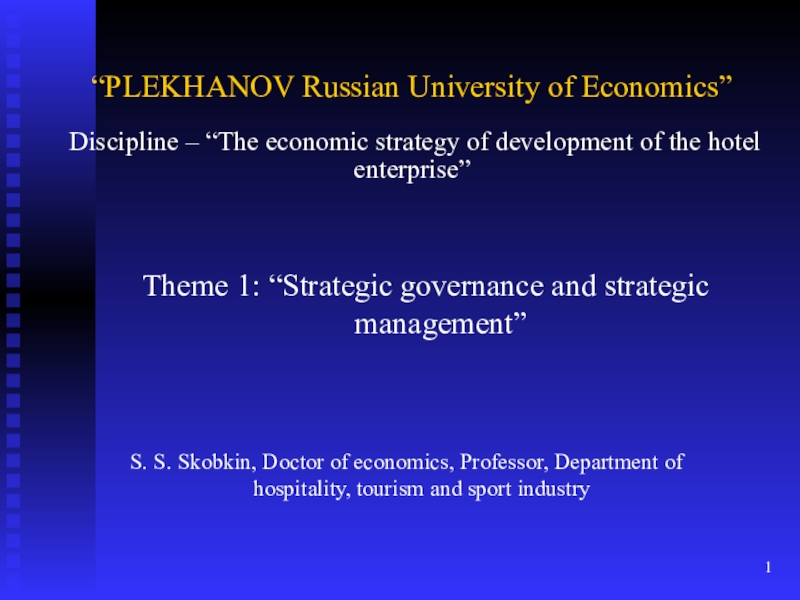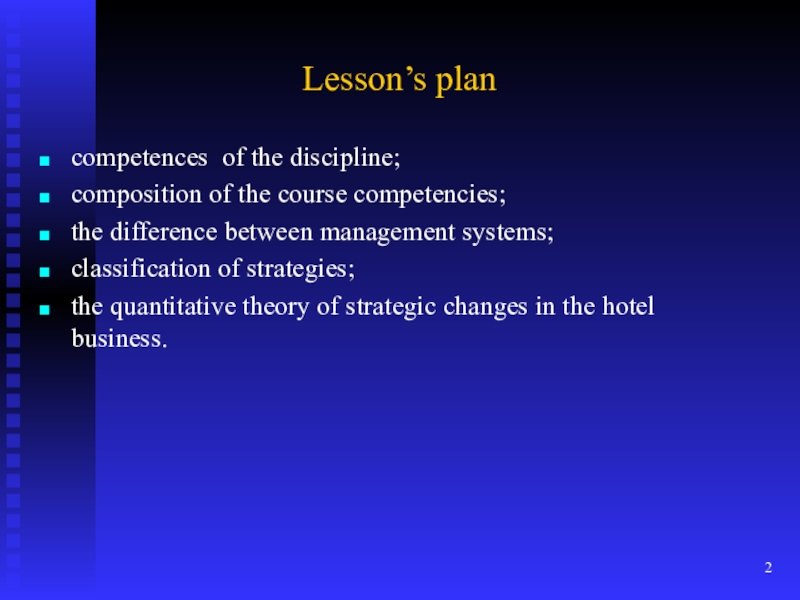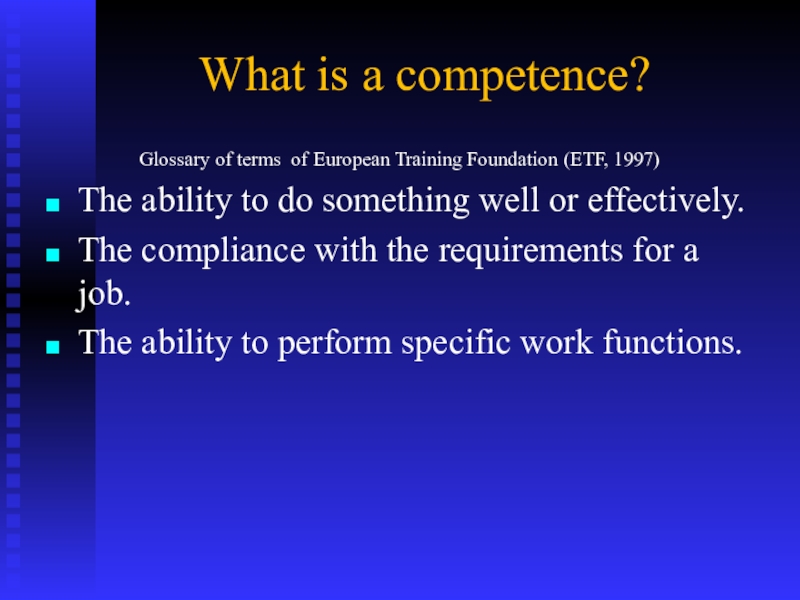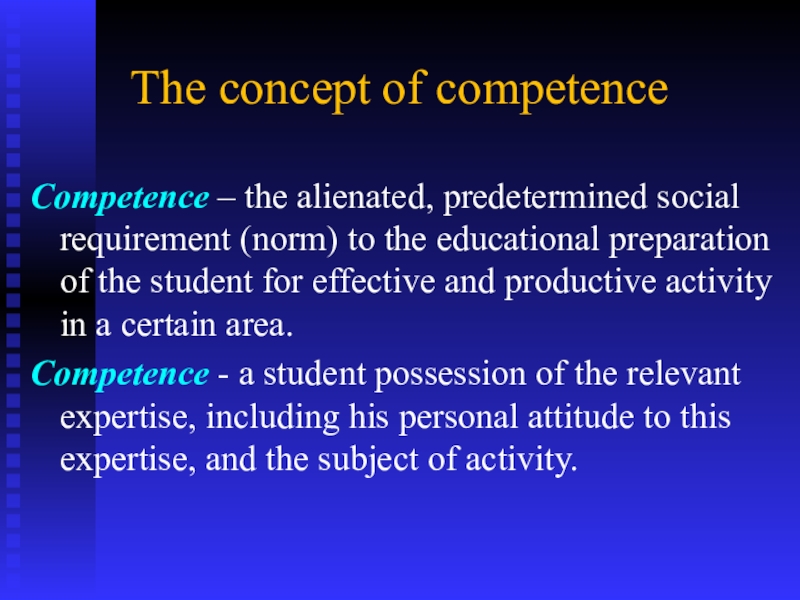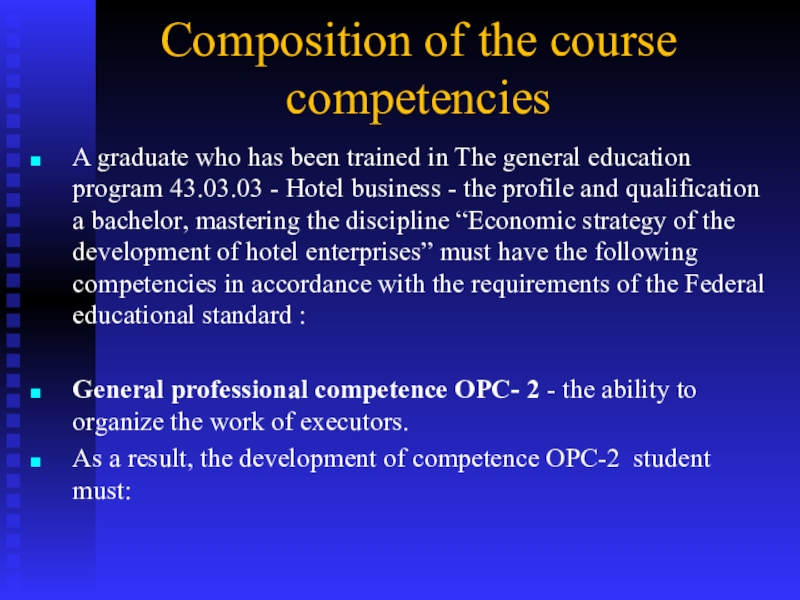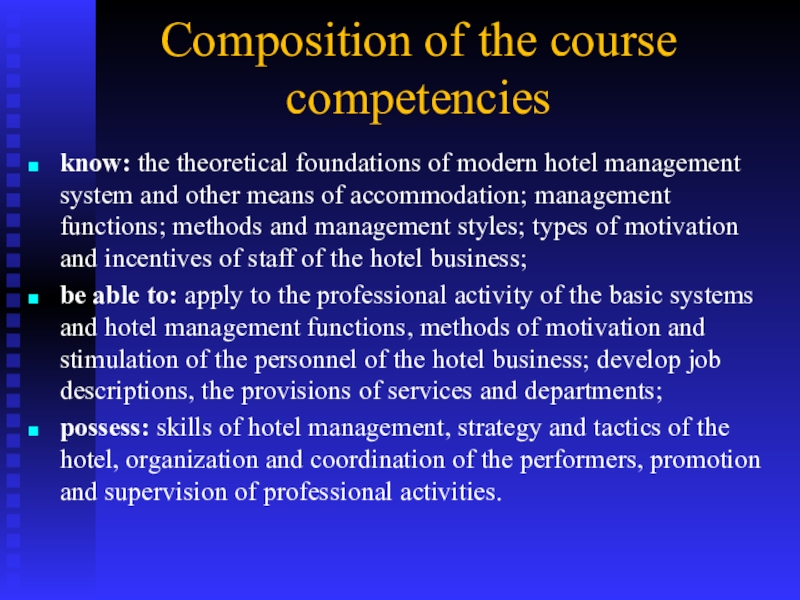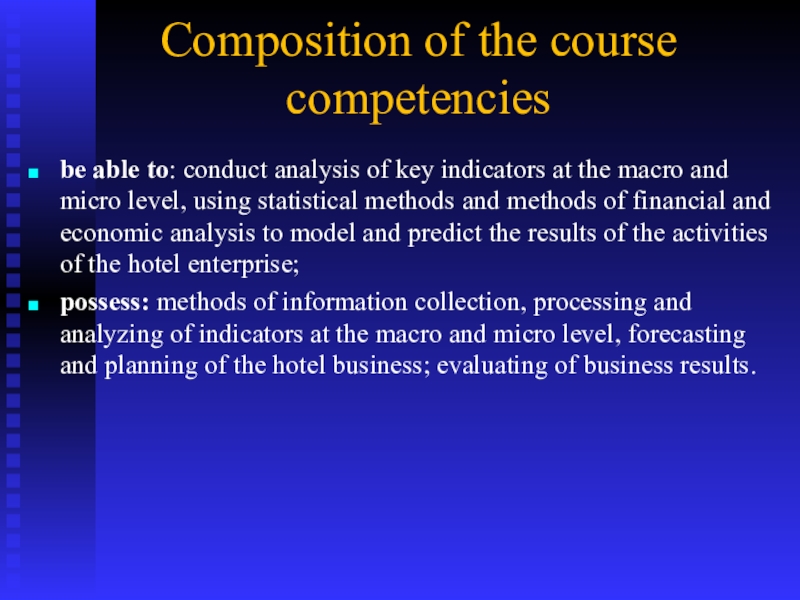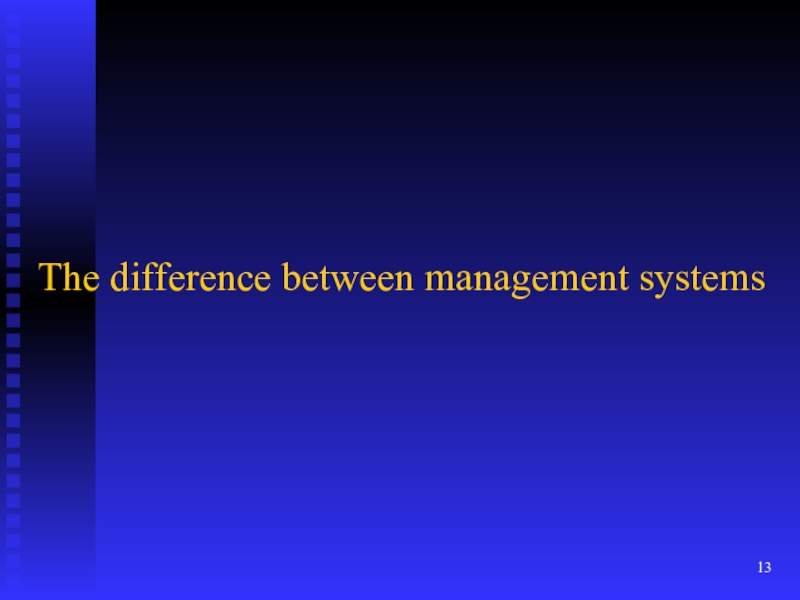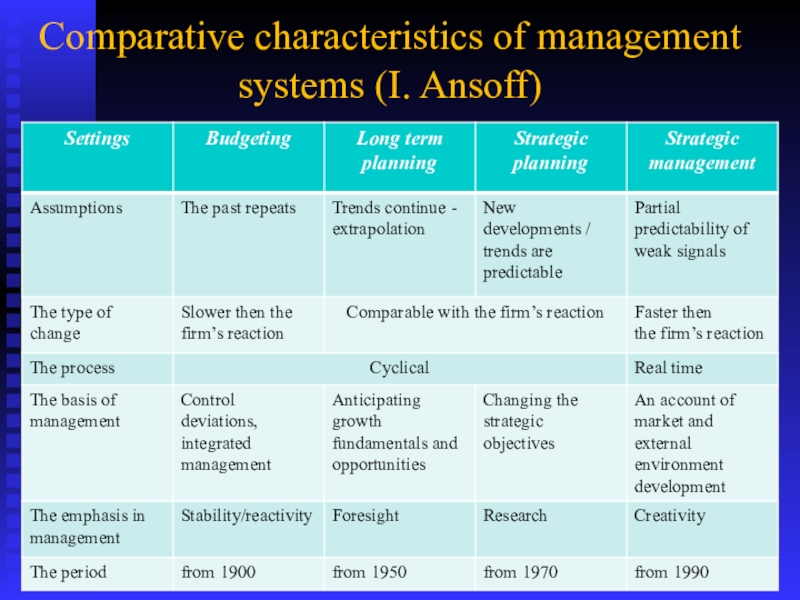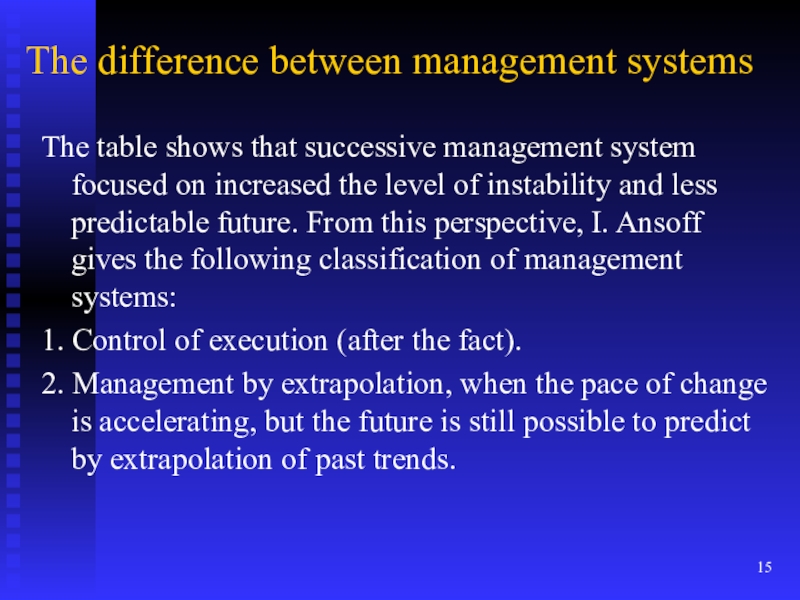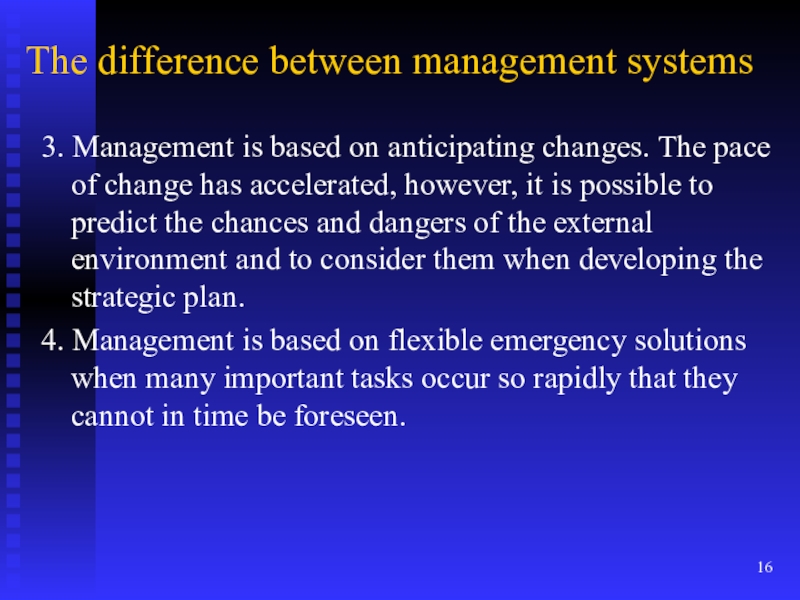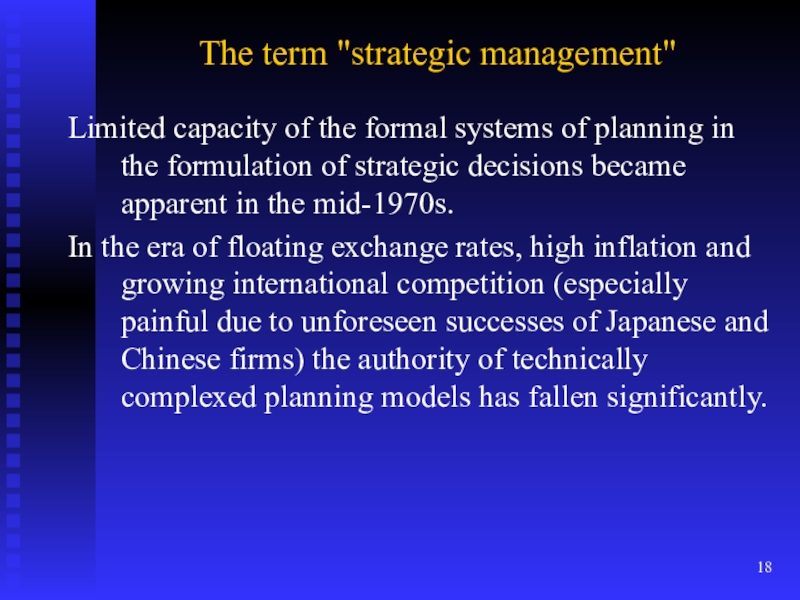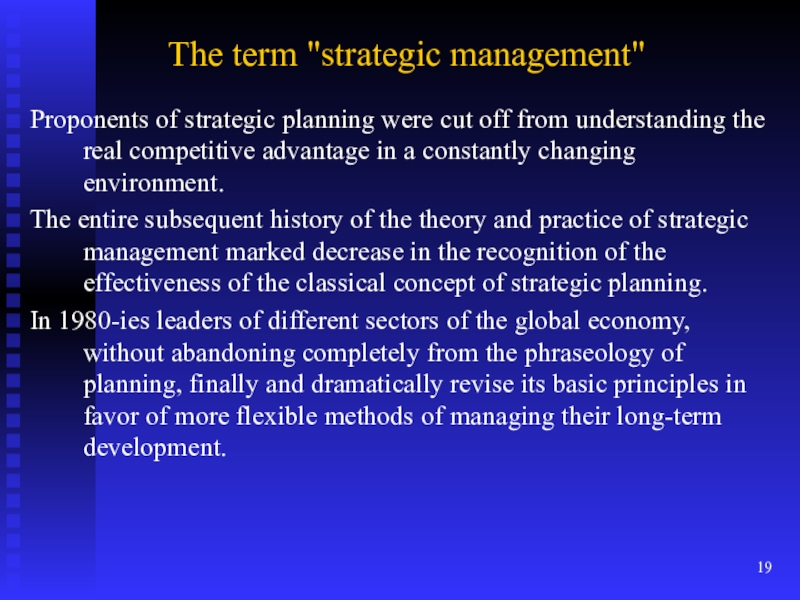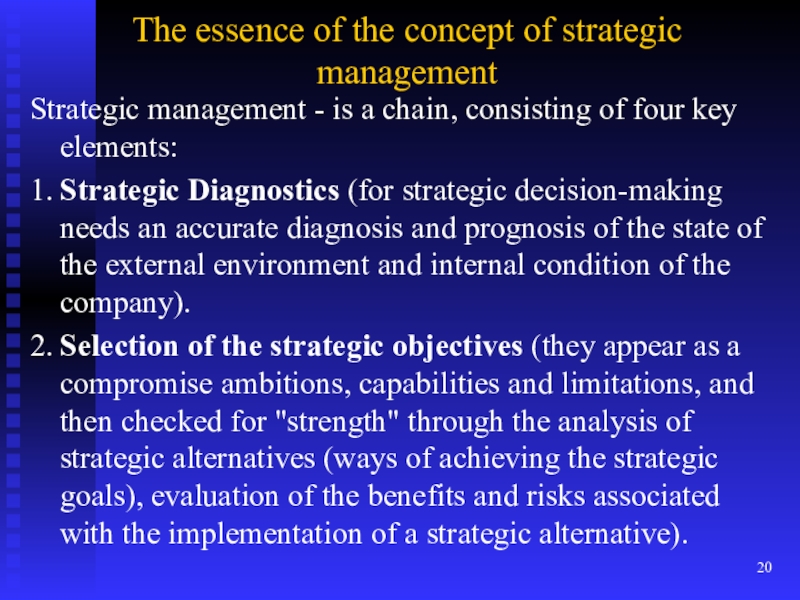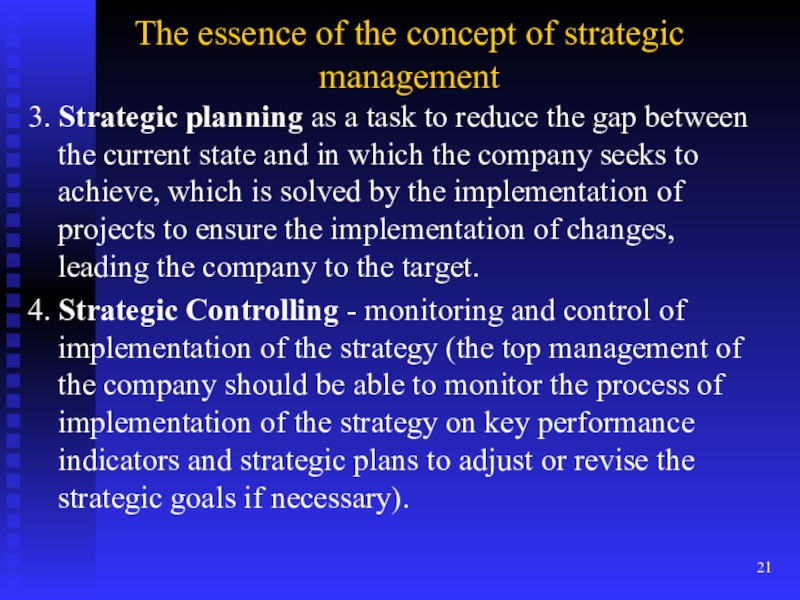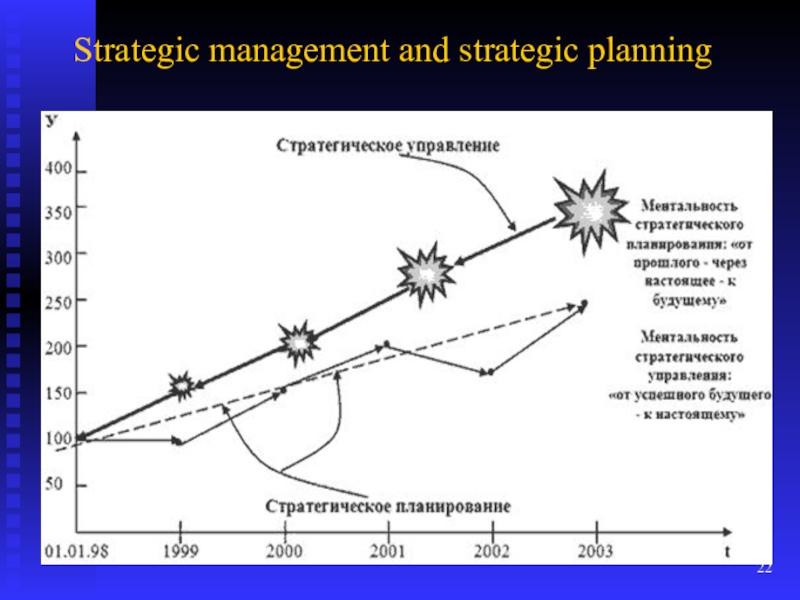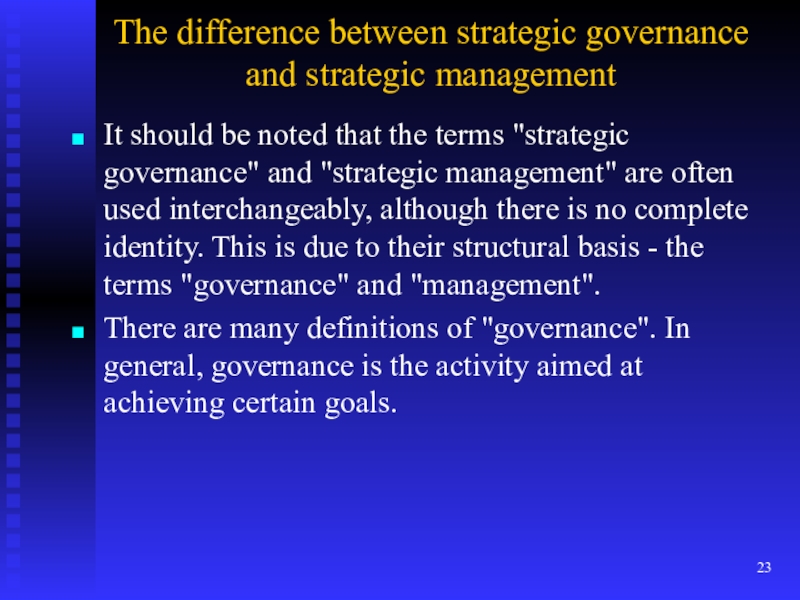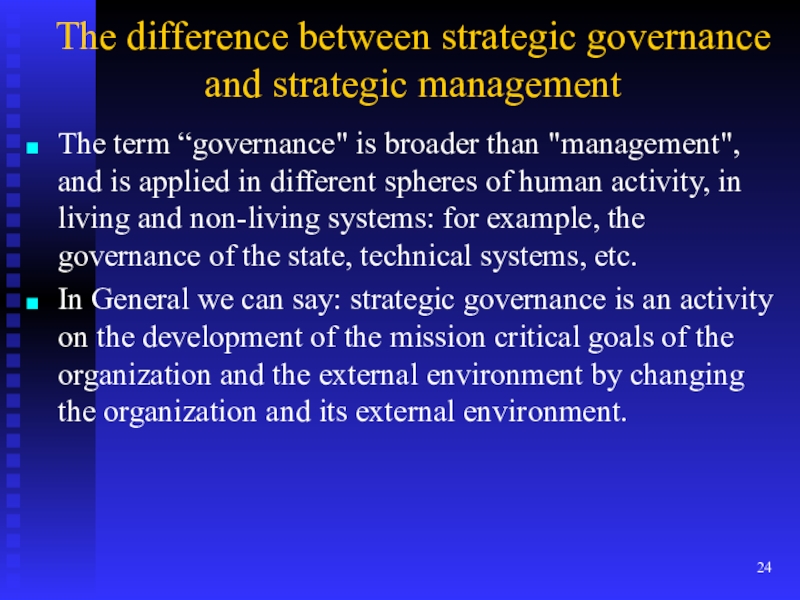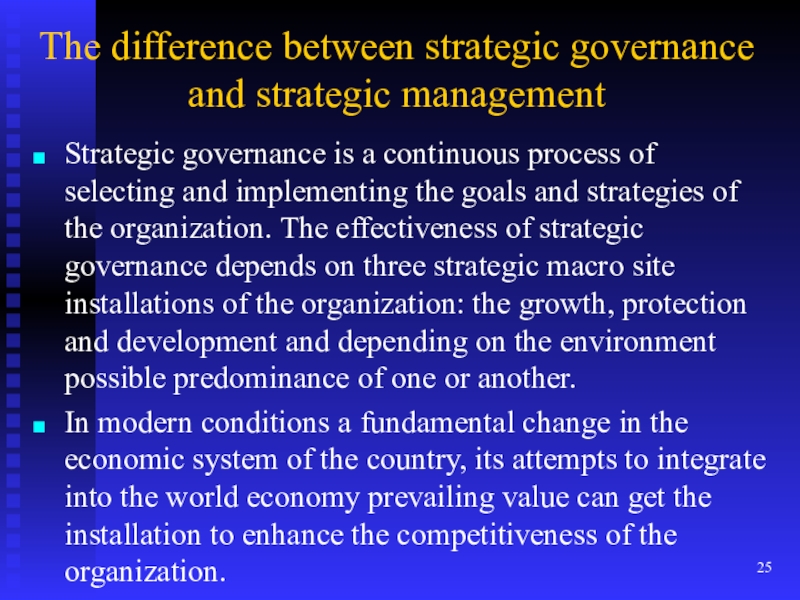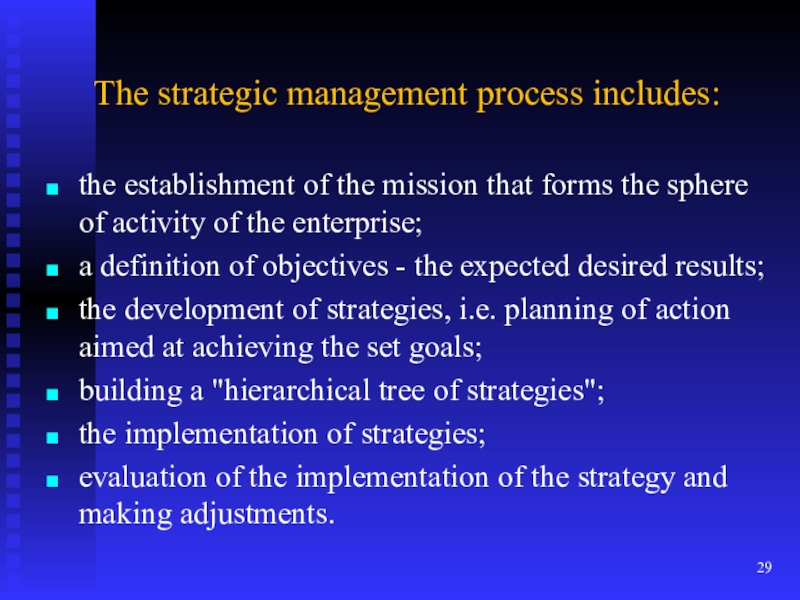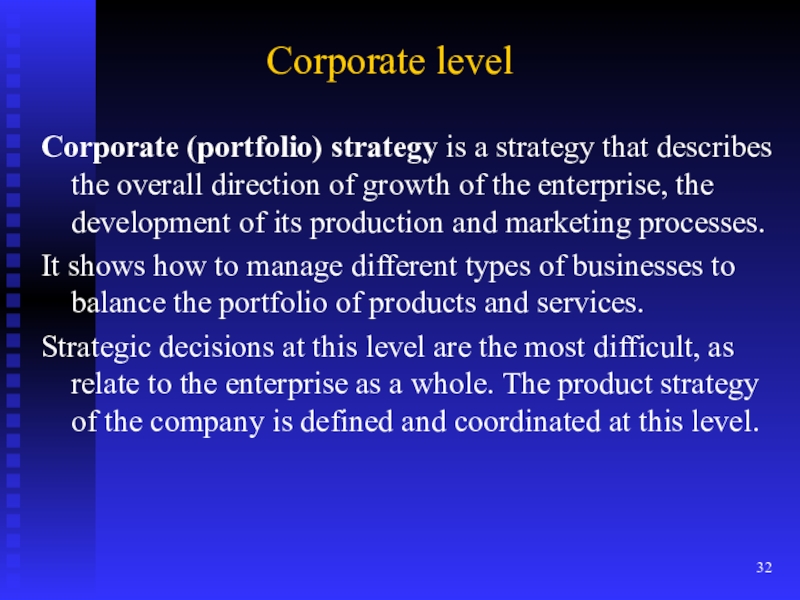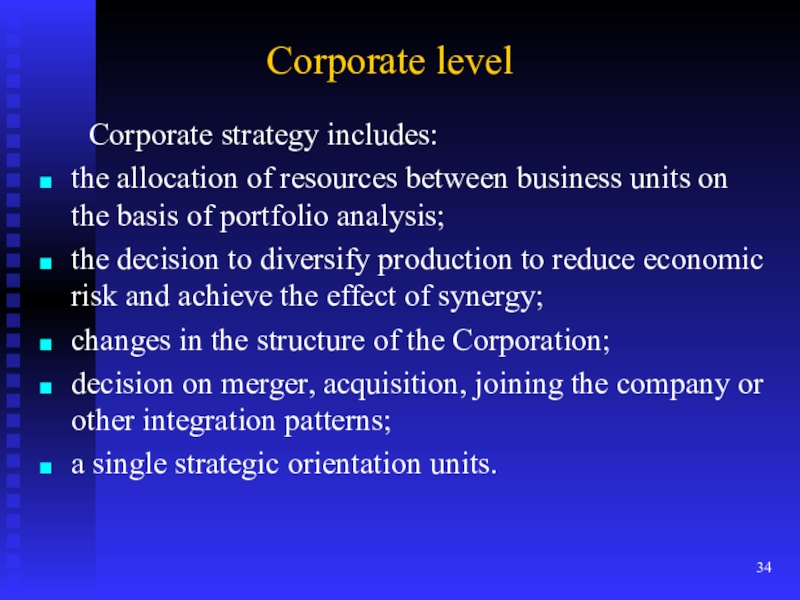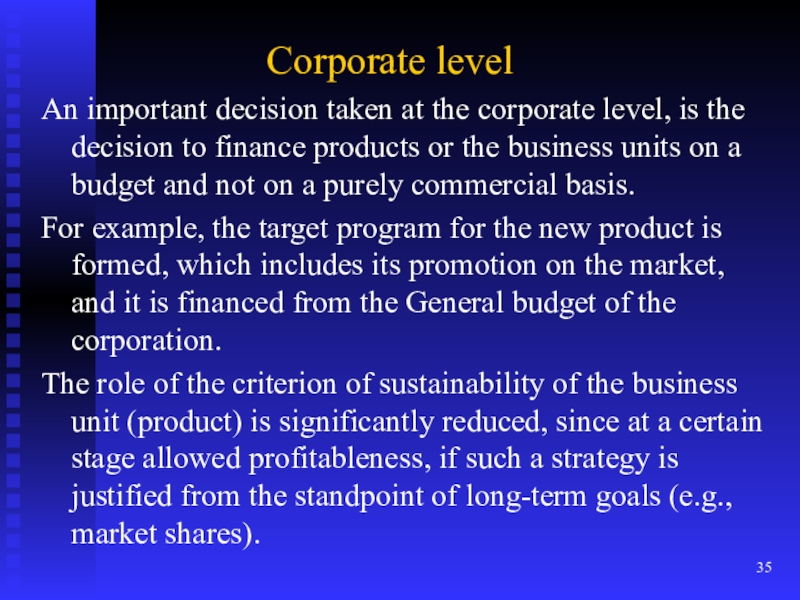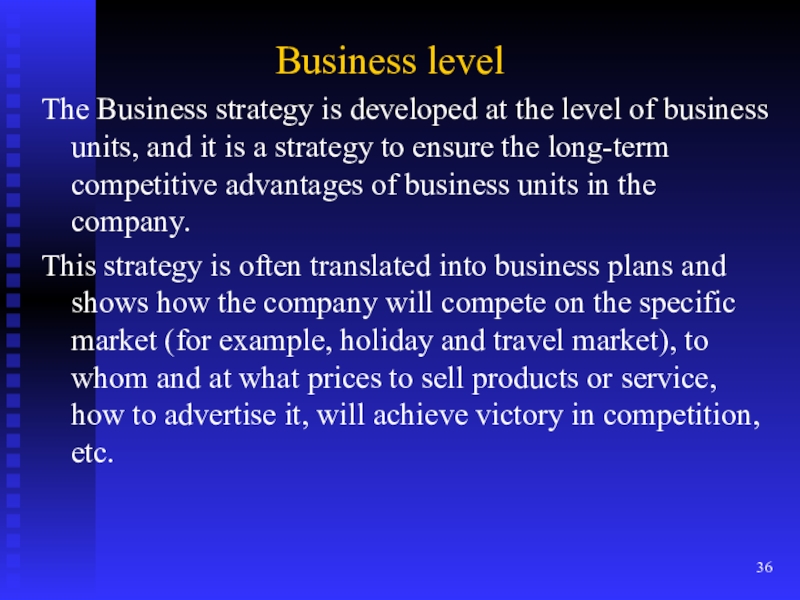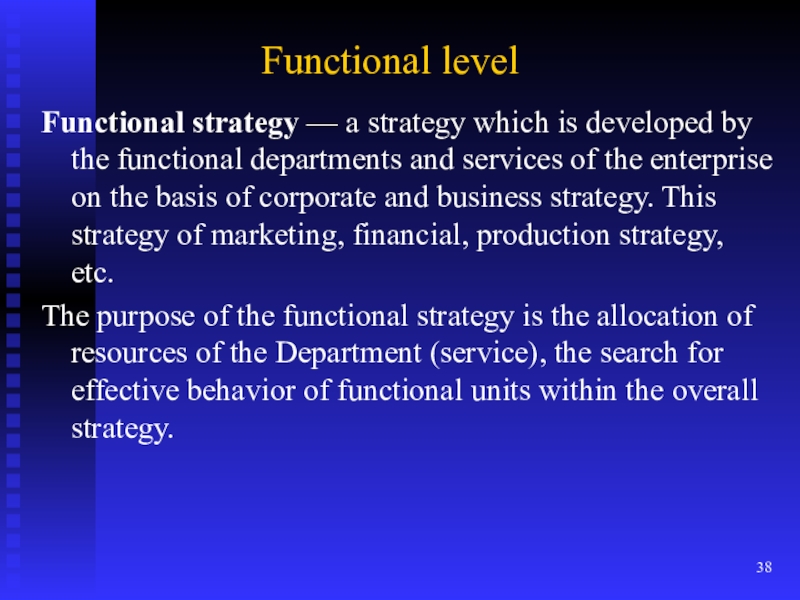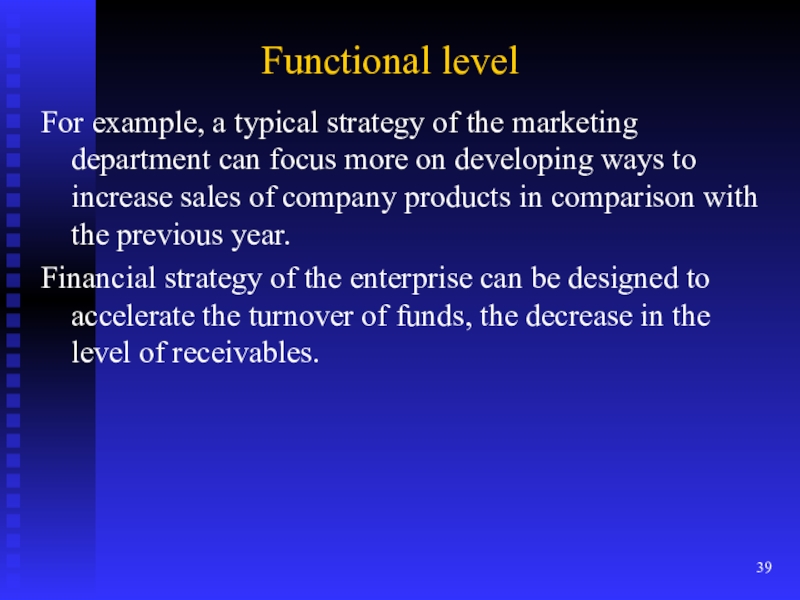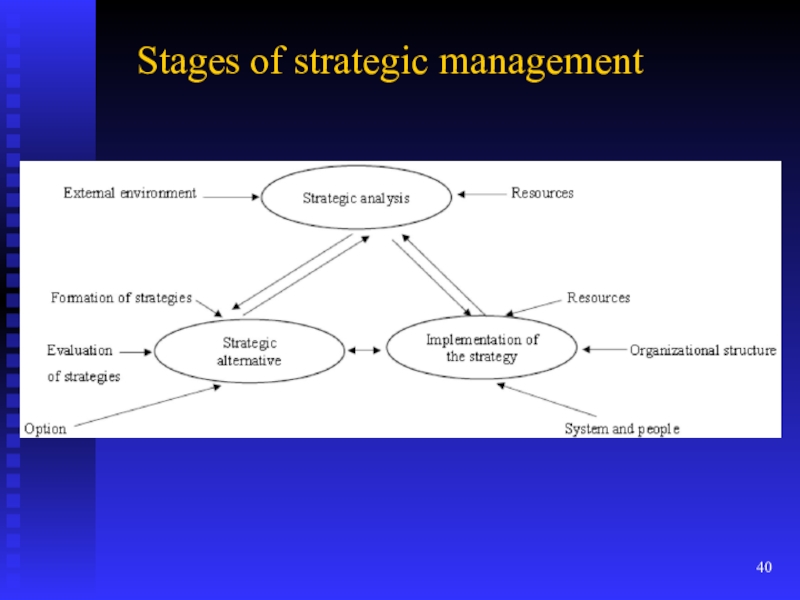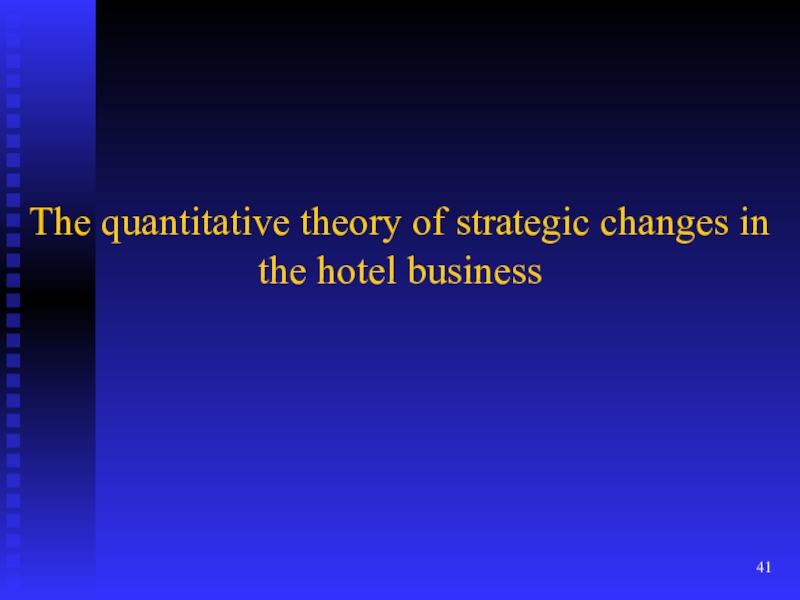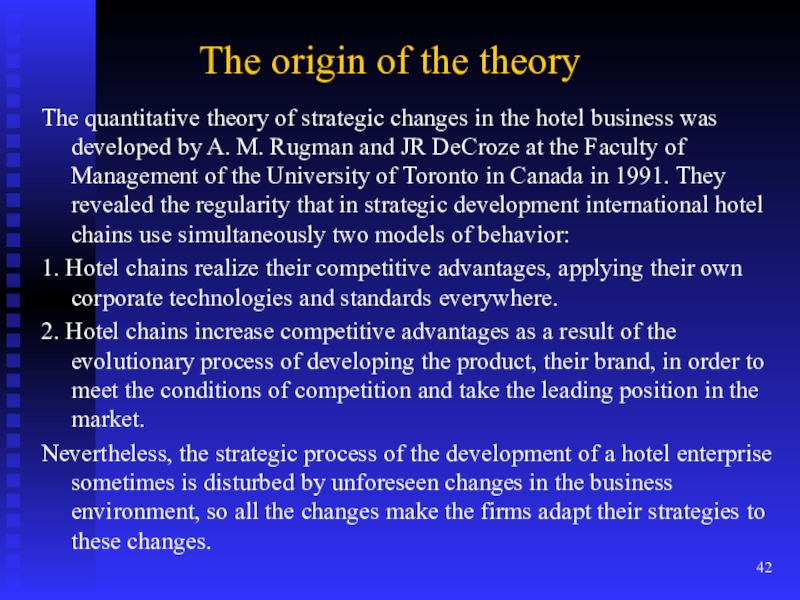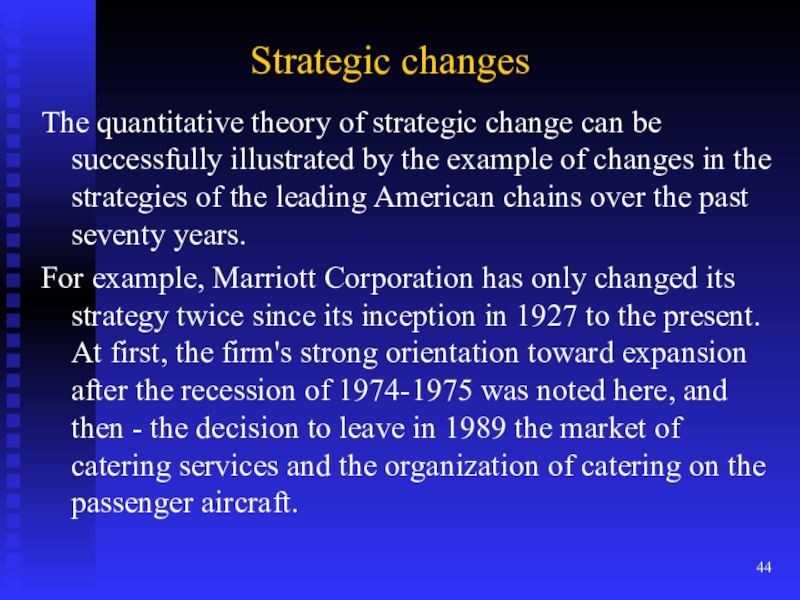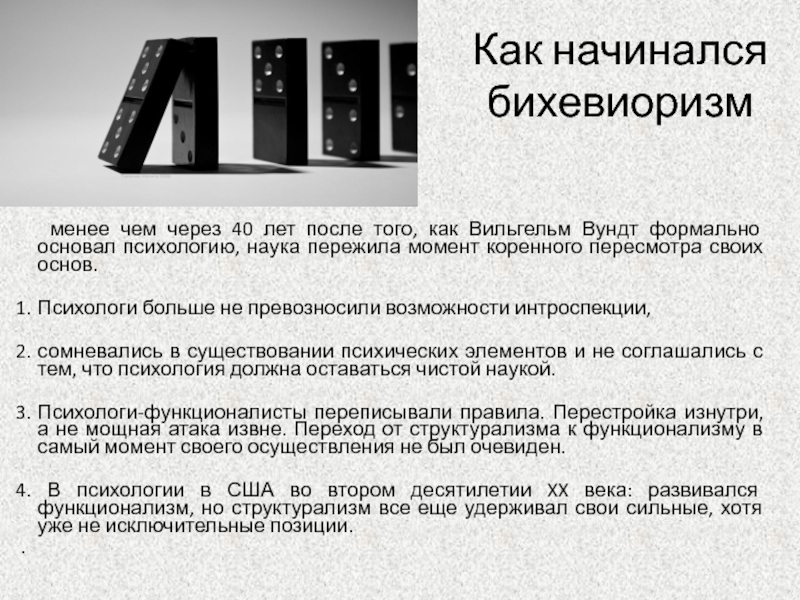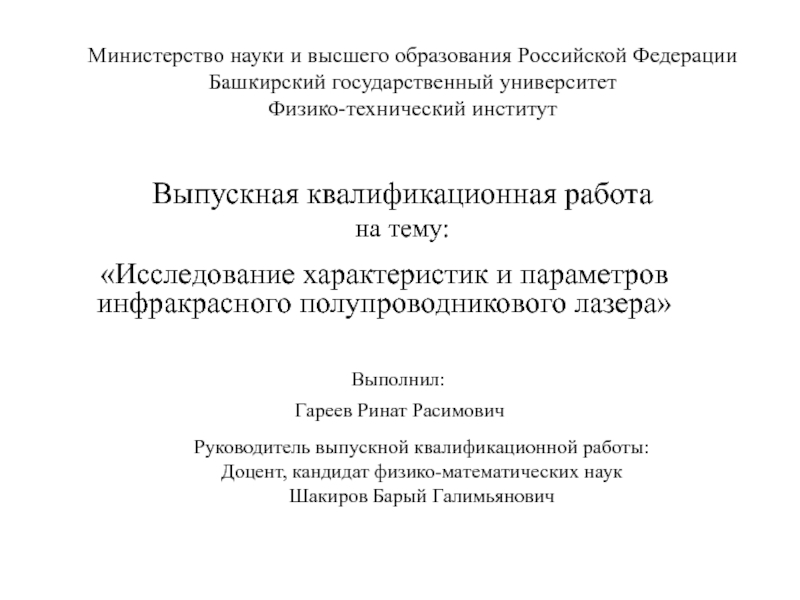Слайд 1“PLEKHANOV Russian University of Economics”
Discipline – “The economic
strategy of development of the hotel enterprise”
S. S. Skobkin,
Doctor of economics, Professor, Department of hospitality, tourism and sport industry
Theme 1: “Strategic governance and strategic management”
Слайд 2Lesson’s plan
competences of the discipline;
composition of the course competencies;
the difference
between management systems;
classification of strategies;
the quantitative theory of strategic changes
in the hotel business.
Слайд 3Competences of the discipline
Слайд 4Early 20th
century
The 70s of the
20th century
Great Britain
USA
The answer to
the
specific order
of professional sphere
Business use of concepts
of "competence",
"core
competencies“ in connection
with the problem
of determining the
qualities of a successful
professional.
A bit of history
Слайд 5Education
Professional sphere
Knowledge
Ability
Skills
Competence
European Council
The concept of competence
Слайд 6What is a competence?
Glossary of terms of European Training Foundation
(ETF, 1997)
The ability to do something well or effectively.
The compliance
with the requirements for a job.
The ability to perform specific work functions.
Слайд 7The concept of competence
Competence – the alienated, predetermined social requirement
(norm) to the educational preparation of the student for effective
and productive activity in a certain area.
Competence - a student possession of the relevant expertise, including his personal attitude to this expertise, and the subject of activity.
Слайд 8Competence - already established quality of individual as a student
with the minimum experience in a given field.
Competence - a
set of personal qualities of the student (value-semantic orientations, professional knowledge, abilities and skills), due to the experience in a specific socially and personally important field.
The concept of competence
Слайд 9Composition of the course competencies
A graduate who has been trained
in The general education program 43.03.03 - Hotel business -
the profile and qualification a bachelor, mastering the discipline “Economic strategy of the development of hotel enterprises” must have the following competencies in accordance with the requirements of the Federal educational standard :
General professional competence OPC- 2 - the ability to organize the work of executors.
As a result, the development of competence OPC-2 student must:
Слайд 10Composition of the course competencies
know: the theoretical foundations of modern
hotel management system and other means of accommodation; management functions;
methods and management styles; types of motivation and incentives of staff of the hotel business;
be able to: apply to the professional activity of the basic systems and hotel management functions, methods of motivation and stimulation of the personnel of the hotel business; develop job descriptions, the provisions of services and departments;
possess: skills of hotel management, strategy and tactics of the hotel, organization and coordination of the performers, promotion and supervision of professional activities.
Слайд 11Composition of the course competencies
Professional competence of the PC-4 -
a willingness to analyze the results of the functional departments
of hotels and other accommodation facilities, the level of customer service, make the appropriate conclusions
As a result of the development of the competence of the PC 4, the student must:
know: the theoretical foundations of the macro and micro economy, patterns of development of the industry and the system of basic macro- and microeconomic indicators of hotel services market; the theoretical basis of business planning and analysis of hotels and other means of accommodation;
Слайд 12Composition of the course competencies
be able to: conduct analysis of
key indicators at the macro and micro level, using statistical
methods and methods of financial and economic analysis to model and predict the results of the activities of the hotel enterprise;
possess: methods of information collection, processing and analyzing of indicators at the macro and micro level, forecasting and planning of the hotel business; evaluating of business results.
Слайд 13The difference between management systems
Слайд 14Comparative characteristics of management systems (I. Ansoff)
Слайд 15The difference between management systems
The table shows that successive management
system focused on increased the level of instability and less
predictable future. From this perspective, I. Ansoff gives the following classification of management systems:
1. Control of execution (after the fact).
2. Management by extrapolation, when the pace of change is accelerating, but the future is still possible to predict by extrapolation of past trends.
Слайд 16The difference between management systems
3. Management is based on anticipating
changes. The pace of change has accelerated, however, it is
possible to predict the chances and dangers of the external environment and to consider them when developing the strategic plan.
4. Management is based on flexible emergency solutions when many important tasks occur so rapidly that they cannot in time be foreseen.
Слайд 17The term "strategic management"
In the world of specialized literature there
is an established understanding that the term the strategic planning
(both in theory and in practice) is replaced in the 1980s by the term the strategic management.
Strategic management is treated as a broader concept: in addition to the strategic planning, it includes the implementation of strategies and strategic control.
Слайд 18The term "strategic management"
Limited capacity of the formal systems of
planning in the formulation of strategic decisions became apparent in
the mid-1970s.
In the era of floating exchange rates, high inflation and growing international competition (especially painful due to unforeseen successes of Japanese and Chinese firms) the authority of technically complexed planning models has fallen significantly.
Слайд 19The term "strategic management"
Proponents of strategic planning were cut off
from understanding the real competitive advantage in a constantly changing
environment.
The entire subsequent history of the theory and practice of strategic management marked decrease in the recognition of the effectiveness of the classical concept of strategic planning.
In 1980-ies leaders of different sectors of the global economy, without abandoning completely from the phraseology of planning, finally and dramatically revise its basic principles in favor of more flexible methods of managing their long-term development.
Слайд 20The essence of the concept of strategic management
Strategic management -
is a chain, consisting of four key elements:
1. Strategic Diagnostics
(for strategic decision-making needs an accurate diagnosis and prognosis of the state of the external environment and internal condition of the company).
2. Selection of the strategic objectives (they appear as a compromise ambitions, capabilities and limitations, and then checked for "strength" through the analysis of strategic alternatives (ways of achieving the strategic goals), evaluation of the benefits and risks associated with the implementation of a strategic alternative).
Слайд 21The essence of the concept of strategic management
3. Strategic planning
as a task to reduce the gap between the current
state and in which the company seeks to achieve, which is solved by the implementation of projects to ensure the implementation of changes, leading the company to the target.
4. Strategic Controlling - monitoring and control of implementation of the strategy (the top management of the company should be able to monitor the process of implementation of the strategy on key performance indicators and strategic plans to adjust or revise the strategic goals if necessary).
Слайд 22Strategic management and strategic planning
Слайд 23The difference between strategic governance and strategic management
It should be
noted that the terms "strategic governance" and "strategic management" are
often used interchangeably, although there is no complete identity. This is due to their structural basis - the terms "governance" and "management".
There are many definitions of "governance". In general, governance is the activity aimed at achieving certain goals.
Слайд 24The difference between strategic governance and strategic management
The term “governance"
is broader than "management", and is applied in different spheres
of human activity, in living and non-living systems: for example, the governance of the state, technical systems, etc.
In General we can say: strategic governance is an activity on the development of the mission critical goals of the organization and the external environment by changing the organization and its external environment.
Слайд 25The difference between strategic governance and strategic management
Strategic governance is
a continuous process of selecting and implementing the goals and
strategies of the organization. The effectiveness of strategic governance depends on three strategic macro site installations of the organization: the growth, protection and development and depending on the environment possible predominance of one or another.
In modern conditions a fundamental change in the economic system of the country, its attempts to integrate into the world economy prevailing value can get the installation to enhance the competitiveness of the organization.
Слайд 26The difference between strategic governance and strategic management
"The English
word "management" - as pointed out by professor B. A.
Reisberg, - meaning in translation into Russian language of "management" and less versatile in comparison to Russian, and refers only to administrative management, leadership.
Therefore, the word "management" should be interpreted in the English language not as a governance in the broad sense of the word, and as the management, administration, organization of the case.
Слайд 27The difference between strategic governance and strategic management
Management relates primarily
to commercial and entrepreneurial type, although in recent years this
term has been used in a more extended plan: towards non-profit organizations, to government governance of the regional economy, if the latter are used for corporate management techniques.
Слайд 28The concept of the strategic management
the strategic management is
a continuous process of selecting and implementing the goals and
strategies of the organization;
the effectiveness of strategic management depends on three strategic guidelines of the company: growth, protection and development;
the predominance of a particular guidelines depends on the state of the environment.
Слайд 29The strategic management process includes:
the establishment of the mission that
forms the sphere of activity of the enterprise;
a definition of
objectives - the expected desired results;
the development of strategies, i.e. planning of action aimed at achieving the set goals;
building a "hierarchical tree of strategies";
the implementation of strategies;
evaluation of the implementation of the strategy and making adjustments.
Слайд 31The organizational levels of strategies :
Modern business, as a rule,
presents the following levels of strategies:
The corporate (corporate level).
Sophisticated and complex
The business (enterprise level).
The complex, integrated and planned
The functional (division level of the enterprise). Simplified and specified - purpose and plan
The operational (level of lower level executive).
Simplified and specified - work order
Слайд 32Corporate level
Corporate (portfolio) strategy is a strategy that describes the
overall direction of growth of the enterprise, the development of
its production and marketing processes.
It shows how to manage different types of businesses to balance the portfolio of products and services.
Strategic decisions at this level are the most difficult, as relate to the enterprise as a whole. The product strategy of the company is defined and coordinated at this level.
Слайд 33Corporate level
Historically, the first business was a single-product. Then the
era of diversification of production brought to the management of
large multi-product enterprises.
The major aim of the corporate strategy is the choice of business units of the company in which to invest.
Слайд 34Corporate level
Corporate strategy includes:
the allocation of resources between business
units on the basis of portfolio analysis;
the decision to diversify
production to reduce economic risk and achieve the effect of synergy;
changes in the structure of the Corporation;
decision on merger, acquisition, joining the company or other integration patterns;
a single strategic orientation units.
Слайд 35Corporate level
An important decision taken at the corporate level, is
the decision to finance products or the business units on
a budget and not on a purely commercial basis.
For example, the target program for the new product is formed, which includes its promotion on the market, and it is financed from the General budget of the corporation.
The role of the criterion of sustainability of the business unit (product) is significantly reduced, since at a certain stage allowed profitableness, if such a strategy is justified from the standpoint of long-term goals (e.g., market shares).
Слайд 36Business level
The Business strategy is developed at the level of
business units, and it is a strategy to ensure the
long-term competitive advantages of business units in the company.
This strategy is often translated into business plans and shows how the company will compete on the specific market (for example, holiday and travel market), to whom and at what prices to sell products or service, how to advertise it, will achieve victory in competition, etc.
Слайд 37Business level
This strategy is also called competitive strategy.
Obviously, the
business strategy for fast food restaurants will differ from strategies
for hotels.
For enterprises with a single view of corporate strategy coincides with the business strategy.
Слайд 38Functional level
Functional strategy — a strategy which is developed by
the functional departments and services of the enterprise on the
basis of corporate and business strategy. This strategy of marketing, financial, production strategy, etc.
The purpose of the functional strategy is the allocation of resources of the Department (service), the search for effective behavior of functional units within the overall strategy.
Слайд 39Functional level
For example, a typical strategy of the marketing department
can focus more on developing ways to increase sales of
company products in comparison with the previous year.
Financial strategy of the enterprise can be designed to accelerate the turnover of funds, the decrease in the level of receivables.
Слайд 41The quantitative theory of strategic changes in the hotel business
Слайд 42The origin of the theory
The quantitative theory of strategic changes
in the hotel business was developed by A. M. Rugman
and JR DeCroze at the Faculty of Management of the University of Toronto in Canada in 1991. They revealed the regularity that in strategic development international hotel chains use simultaneously two models of behavior:
1. Hotel chains realize their competitive advantages, applying their own corporate technologies and standards everywhere.
2. Hotel chains increase competitive advantages as a result of the evolutionary process of developing the product, their brand, in order to meet the conditions of competition and take the leading position in the market.
Nevertheless, the strategic process of the development of a hotel enterprise sometimes is disturbed by unforeseen changes in the business environment, so all the changes make the firms adapt their strategies to these changes.
Слайд 43The concept of the theory
Large hotel companies, successfully working in
the market, are responding to revolutionary changes in the business
environment by introducing quantitative changes into their strategic courses.
Based on this observation, a quantitative theory of strategic changes was formulated, meaning that the number of successive changes leads to a qualitative change in the strategy.
Constant changes are introduced into the strategy, however, the strategies of hotel companies are changing in a cardinal way rather seldom.
Слайд 44Strategic changes
The quantitative theory of strategic change can be successfully
illustrated by the example of changes in the strategies of
the leading American chains over the past seventy years.
For example, Marriott Corporation has only changed its strategy twice since its inception in 1927 to the present. At first, the firm's strong orientation toward expansion after the recession of 1974-1975 was noted here, and then - the decision to leave in 1989 the market of catering services and the organization of catering on the passenger aircraft.
